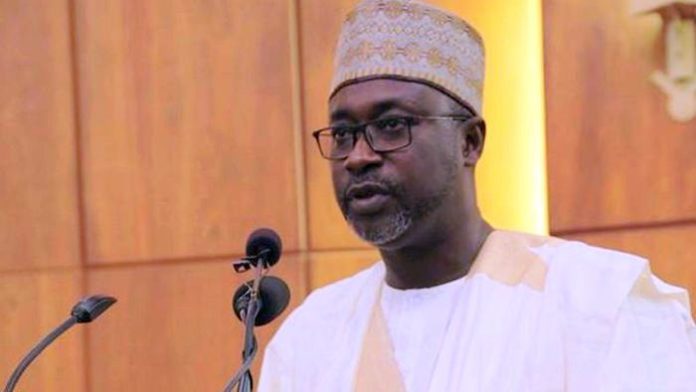By Nkiru Dim
As the saying goes “water is life” and Nigeria is blessed with abundant Water Resources but its sustainability is threatened by land degradation, deforestation, rapid population growth, poor sectoral investment, poor regulation as well as climate change. Having in mind these challenges and the importance of water in sustaining lives, the Ministry of Water Resources, therefore needs a seasoned and dedicated professional to be at the helm of affairs. The impact of water resources projects and programmes on the Nigerian people under the leadership of Engr. Suleiman H. Adamu FNSE, FAEng, is indeed conspicuous.
Together with his team, the Minister has done a lot to serve the Nigerian people by striving to meet water demands for human consumption, agriculture, industrial, tourism, hydropower, among others, without compromising the ecosystem. Engr. Adamu made it clear that the Ministry under his leadership would restore professionalism in projects undertaken by the Ministry and its Agencies.
Before Engr. Adamu took the mantle of leadership of Water Resources Ministry, there were about 116 uncompleted projects. He prioritized the abandoned projects and presently 35 projects have been completed, some were cancelled because they were not viable, while some were handed over to State Governments because they would be better handled by them. The Minister intends to bring the number of completed projects to 50 before leaving office.
The Minister’s focus was mainly to complete the abandoned projects inherited in order to meet the Ministry’s core mandate which include development of Nigeria’s water resources to improve the supply of portable water, development and improvement of irrigation systems and development of hydro-power infrastructure.
In his words “if you leave all the inherited projects and start new ones, chances are you may not finish the new ones either, so what have you done? Older projects have not been finished, the new ones you may have started are not finished and it has become a vicious circle. So it was a professional judgement on our part to finish all inherited projects rather than engaging in new ones”.
The Minister was able to improve efficiency due to the institutional reforms he introduced to strengthen the water sector. Some of the reforms include institutionalization of evidence-based planning and cultivating the culture of continuity in project planning and implementation.
Other reforms include medium and long term holistic strategic planning with all-inclusive stakeholders’ involvement, collaboration and partnership in planning, design and implementation of projects and interventions. The members of staff are not left out. The Minister believes in manpower development and significant attention was given to training and retraining of both technical and non-technical staff of the Ministry and its Agencies in order to build sustainable human resource capacity.
These reforms and projects undertaken have succeeded in turning around and repositioning of the water sector with improved performance efficiency in the sector.
The landmark achievements of the Hon. Minister of Water Resources cut across Water Supply, Water Quality and Sanitation, Irrigation, Dam Development, Capacity Development and international cooperation.
Increase in population and deteriorating infrastructure notwithstanding, the Ministry vigorously pursued strategic programmes to increase national access to water supply to improve sanitation and hygiene. The Water, Sanitation and Hygiene (WASH) sector is crucial to all human existence and socio-economic development of the nation. It is worthy to note that about 70% of tropical ailments are water related and could be greatly reduced with portable water supply, improved sanitation and good hygiene practices. A healthy nation with low disease burden will translate to higher productivity and enhanced national economic well-being.
The declaration of state of emergency in the WASH gave birth to the National WASH Action Plan (2018) to provide the needed roadmap for sustainable water supply and sanitation towards achieving SDG target of ensuring access to water and sanitation for all by the year 2030. This also gave birth to the National programme to end open defecation in Nigeria by 2025 tagged “Clean Nigeria: use the Toilet” campaign. The Ministry is actively collaborating with the Organized Private Sector to end open defecation by 2025 which led to the formation of Organized Private Sector for WASH (OPS – WASH). This forum and the Ministry have constructed Sanitation and Hygiene facilities in the public places nationwide e.g markets, schools, parks, health facilities, IDP host Communities and cholera hot spots.
The Ministry as a strategic partner in the management of the novel covid-19 pandemic took critical steps such as awareness campaign on the role of WASH in curtailing covid-19. It developed major activities in the water sector as contained in the National Economic Sustainable Plan (NESP), Rehabilitation and Construction of WASH facilities across the nation.
Another major milestone achievement for rural Water and Sanitation improvement is the development of the Partnership for Expanded Water Supply, Sanitation and Hygiene (PEWASH) programme. The PEWASH is a collaborative/partnership intervention model between major stakeholders including the Federal Government, State Government, Local Government, communities, Donor Agencies/Development partners and the private sector towards achieving the SDG’s in Nigeria.
In Irrigation and Drainage, a national Irrigation Development programme was initiated in 2018 to support the present Administration’s drive towards diversifying the economy to ensure food security and job creation. The Federal Government has built over 400 dams (classified as large, medium and small) spread across the Country which are being utilized for irrigation, water supply, hydropower generation and navigation improvement. The development of dam infrastructure created over 20,400 direct jobs and 16,000 indirect jobs.
Concrete steps were taken by the Ministry to revitalize the twelve River Basin Development Authority (RBDA) under its supervision. The steps were to enable them live up to expectation as operators, managers and developers of water resources infrastructure within their state of jurisdiction to improve socio-economic wellbeing of the grass root population. The RBDAs constituted 42 small dams across the nation and some are currently being utilized to support the aquaculture farms to boost food security.
The Ministry, with the support of World Bank under the Urban Water Sector Reforms project established the National Water Resources Information System (NAWIS), to facilitate the production of timely and credible data for the efficient water resources planning, development and management.
Engr. Adamu ensures that the Ministry utilizes the engagement of Development Partners, Private Sector, State Governments and Inter-Ministerial (Power, Agriculture, and Environment). The Ministry’s programme has enjoyed the support of various Development Partners ranging from inputs and fund intervention to help in delivering of water infrastructure and implementation of reforms for State Water Agencies. Some of the Development partners are the World Bank, Africa Development Bank and French Development Agency.
The Ministry is collaborating with Ministry of Power to ensure the utilization of its Hydropower potential of a total of 12,200 MW out of which 1, 930 MW (Comprising Kainji, jebba and shiroro) have been developed, plus other medium power plants.
In the area of International cooperation, Nigeria is a member of the Niger Basin Authority and Lake Chad Basin Commission (LCBC). In 2018, Nigeria hosted the International conference on lake chad which climaxed with the launch of “the Abuja declaration” signed by the Heads of State and Government of LCBC and endorsed on the Inter-Basin Water Transfer (IBWT) from the Congo Basin as the most viable option to revive the lake.
The Minister is the current Vice President of a Pan-African Intergovernmental Organisation, ‘Africa Ministers’ Council on Water (AMCOW), which was formed in 2002 in Abuja, Nigeria to promote cooperation, security, socio-economic development and poverty eradication among African Union (AU) member States. This would be achieved through effective use and sustainable management of the continent’s water resources and provision of water supply and sanitation services.
Engr. Adamu desires that the Ministry will have regulatory framework through the passage of the National Water Resources Bill to enhance efficient management of the nation’s water resources in line with the principles of Integrated Water Resources Management (IWRM). It is believed that the passage of the bill into law by the National Assembly will create a stable and attractive environment for Investors and Development Partners and equally address the problem of proliferated underground water exploitation without due consideration of its implication on the ecosystem. The proposed water law will help to check unbridled pollution of water bodies and its threat to human health and the environment. Also the passage of the bill into law will enable the Minister achieve all his aims and focus on the development and overall growth of the nation’s water resources.





